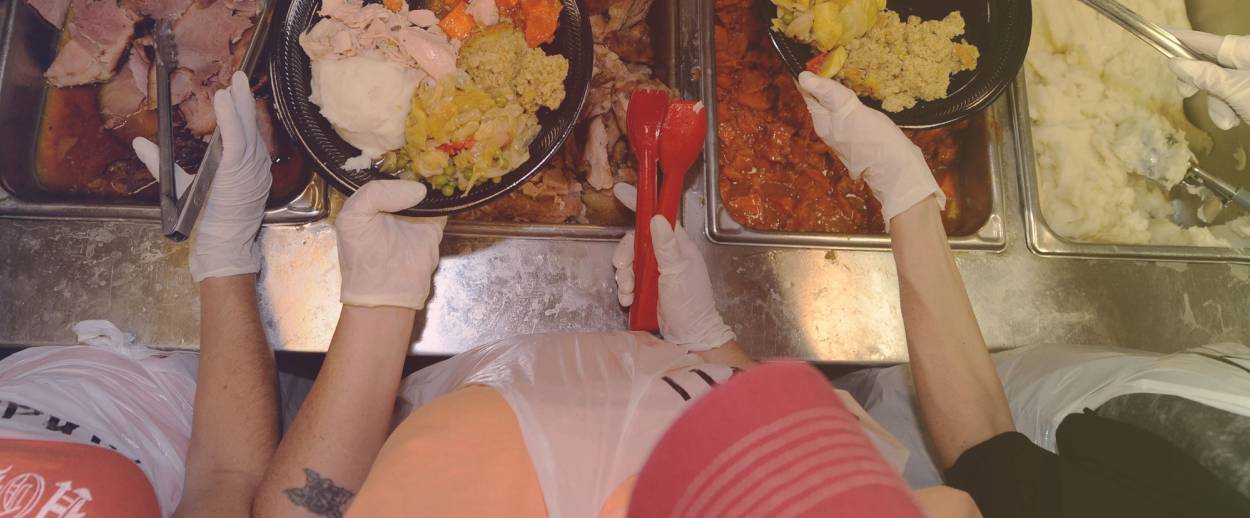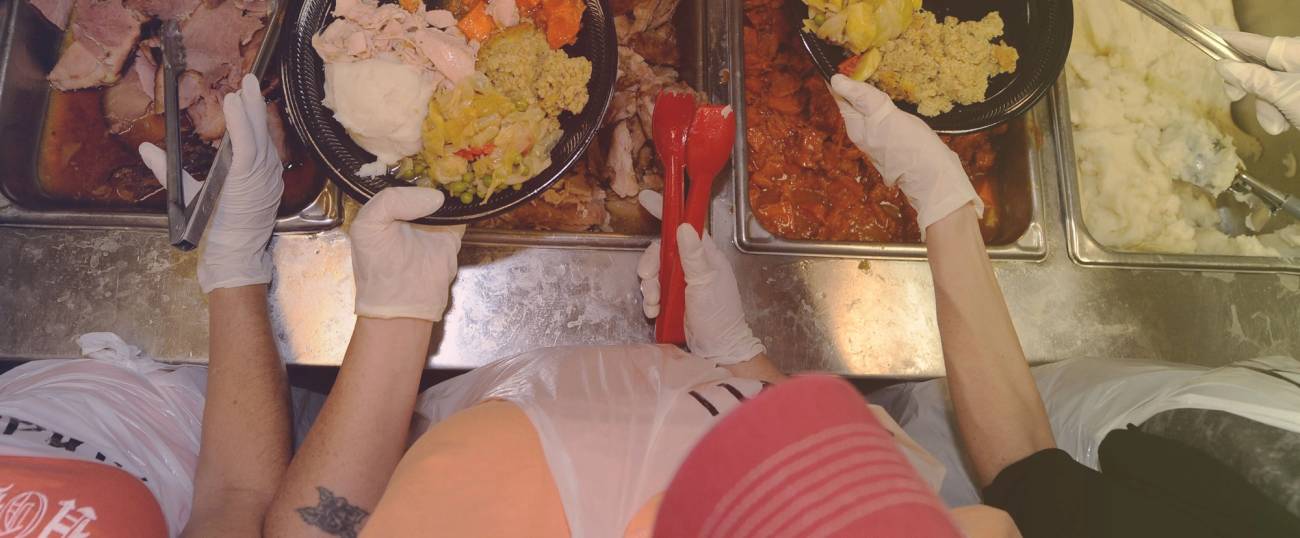Elijah’s Plate
Facing my first Christmas alone in decades and volunteering at a nearby soup kitchen, I discovered an unexpected and enveloping community




Last year, after 29 Christmases with my Jewish, tree-decorating, stocking-stuffing, carol-singing in-laws, I realized I’d be alone for Christmas. These things happen, my friend Zena, the Euripides scholar said. (If you want the long view, ask a classicist.)
The last time I was alone for Christmas, I had to be told it was a problem. It was 1979, and I was living in a cold, damp flat in West London, earning a pittance in publishing. When a colleague asked about my plans for Christmas, I said I had none. “Poor dear,” she exclaimed, “alone for Christmas. We won’t have that!” I kept to myself that I had never before celebrated Christmas. Two days later, I hopped aboard the family “dormobile,” a VW microbus with mattresses on the floor instead of seats. The kids—Annabelle, Natasha, Tristram—and I slept in our coats and woke up in Inverness. We stayed in a hunting lodge heated (imperceptibly) by an Aga stove in the kitchen and lit by a whining generator that was powered down at bedtime. Christmas Eve we trekked across the moor to a small cabin—a Scottish shtibl—and sang carols with the local crofters. Christmas day, we baked a Christmas cake full of sultanas, popped Christmas “crackers” (a wrapped tube that snaps open like a cap gun), and took the Guardian’s Christmas Quiz. Christmas night I warmed myself with Glenfiddich, a hot-water bottle, and a novel about sweltering Rhodesians. So this was Christmas: dark by 3 p.m., bone-cold, but otherwise not bad, not bad at all.
Thirty years later, I’m alone for Christmas, and I know it. I ponder a solitary afternoon of chow fun and Meryl Streep, and I decide I won’t have it. Instead, I sign up to work at Elijah’s Promise, a nearby soup kitchen, in a basement in New Brunswick, New Jersey.
When I arrive, I’m hurried off to wash my hands, issued a hairnet and plastic apron, and told to find Felipe, “the guy in the red apron.” He’s a stocky guy with a biker’s swagger and a wide, open smile; among the volunteers, an eminence. His charges are me and Gwendolyn, a lithe, black 20-something with amber eyes. She seems embarrassed by her beauty, like a swan caught becoming a woman.
Felipe explains our task. At noon, when the doors open, the line of people waiting out in the cold will file in. (Pairs of legs, hopping to keep warm, can be seen through the basement windows.) Each client, as the patrons are called, will take a carnival ticket and sit in front of a red or green placemat adorned with snowmen, candy canes, and Bible verses scrawled in a child’s cursive hand. Our job is to serve them dinner. Like school kids on a lunch line, we’re to present our trays to the women of the missionary club of the First Baptist Church of Carteret, who will portion out the turkey dinner—with green beans, sweet potato, gravy, and cranberry sauce—the women spent Christmas Eve preparing.
“If they ask for seconds?” I ask.
“Sometimes they do, but most don’t stick around,” Felipe says. “Some of them eat and run to catch the shuttle to the other soup kitchens in town, they go from one Christmas dinner to another.” He shrugs, amused. “Ya can’t blame them.” The cohort of volunteers has swelled, most of them African-American: a grizzled 75-year-old man, a tall dad with two skinny-jeaned teenage daughters, assorted able-bodied young men, one goateed like a calendar Confucius. The only other white person is a well-heeled petite woman in a chunky cable sweater. She’s Jewish, and I think I know what she’s doing here—repairing the world where it’s caving in. But how many of those here are alone for Christmas, like me, without husbands, wives, parents, children?
Felipe has left us to join a woman with a reporter’s pad at a nearby table. Apparently he’s not just the majordomo; he’s also the press secretary. But Gwendolyn knows the drill. “The hungriest folks will wave their tickets in the air,” she says. “Serve them first. See that everyone at the table is served at the same time. And don’t bus their plates; they have to do that themselves.”
While we wait for the stroke of noon, we place a platter of pie—slices of pumpkin, pecan, and pineapple—on each table, then pour 80 paper cups of V8 juice. One of the skinny-jeaned teens sticks out her tongue in disgust “V8?” “Never mind,” says one of the Carteret ladies. “It’s filling and nutritious. It’s almost soup.”
At noon, the doors open, and the line of people slowly slithers in. I ask myself if, out on the street, I could peg these people as Elijah’s clients. The answer, for nine out of 10, is yes. Many are elderly and move slowly; they walk with difficulty, as though back pain is a fact of daily life, not a cause for steroid shots and acupuncture. Several are missing front teeth, and here and there are cheeks with open sores. The men tend to be unshaven; the women look more kempt, and a few sport silver and green Christmas beads. Some are both hungry and obese, which is perhaps why there are diabetes information posters on the walls, in English and Spanish. And many, more than I want to admit, have a withdrawn, absent look that means—what? That they’re resigned to life on the bottom? Or that fate has consigned them to the limbo of their minds?
A clutch of teens from a nearby Hindu temple appear out of nowhere, giving each client a wrapped, ribboned gift, a pair of gloves, and a scarf. “Let us bow our heads!” bellows an elder of the First Baptist Church, then he mumbles a speedy grace. The Hindu teens, as if on cue, begin to sing “Rudolf the Red-Nosed Reindeer,” reading the lyrics off their Blackberrys. Singing along are four siblings ranging in age from 3 to 8, the only little kids in evidence. Two walked in with winter jackets, two did not; all are clad in Gymboree castoffs of aqua and pepto-bismol pink. Presently trays arrive for them with plates of baked ziti, not turkey; they’re vegetarians. While mom runs off in search of missing napkins, spoons, juice, dad hovers to make sure they finish their food.
It turns out Gwendolyn was wrong. The hungriest are not the ticket-wavers. The hungriest are the ones who sit down and tear into the pie on the table. One woman drains a styrofoam cup of water and begins stuffing it with pumpkin pie; the pie’s to go. I bring a plate of food to a man in a black overcoat whose placemat has verses from scripture but no utensils. I’m starting to feel expansive, and put my hand on his shoulder. “You can’t eat string beans off the words of God,” I say, and offer to fetch utensils. “Fuggetit, darlin’,” he says broadly and plucks a fork from his overcoat pocket. Five minutes before closing, two stragglers arrive: an old man in an army jacket and a large woman lashed in scarves and bundled in three layers of coats. They’re not ticket-wavers; in fact, they keep their eyes on the table and speak to no one, so abject, they make the others look like game-show hosts.
It’s good to be busy, and I’m saying “Merry Christmas” to all comers, happy to be wished one in return. There’s a buzz of purpose and enthusiasm, at the tables, in the kitchen, among the ferrying volunteers. In fact, I’m starting to feel freilach, and not because it’s Christmas. It’s like being at the wedding of a beshert match: a hungry person, a steaming plate of food.
Felipe’s journalist is heading for the door, and Felipe returns to the lunch counter. He’s revved, a little anxious; whatever that interview was about, it didn’t go so well. “She heard that I’m the volunteer of the year, that I’m taking the culinary arts course,” he says. (Elijah’s Promise doesn’t only feed people; they train people to feed others.) “I told her I started coming here every day to give something back, but all she wanted to know about was how I ended up in prison. She smelled a story, but I wasn’t gonna talk about it. Those journalists, they seem interested, but they just wanna sell papers.”
“You have to be careful with journalists,” I tell him. “At least you have to make them read back the quotes.”
“I told her mainly I come here because I love the volunteers,” Felipe continues. “They just love doing what they do, taking care of these people. So what if some are just putting in hours for their community service?” I take a second, harder look, at my fellow volunteers—felons? Misdemeanants?— but all our crimes are expunged by the smell of ammonia. The goateed man stacks the chairs, and a guy with a bandana mops up. Gwendolyn and I wipe down tables. At each, two or three cups of V8 remain, uncouth, unkissed.
When I get home, I look up Elijah’s promise. It is not, as I’d assumed all day, a story about Jesus. It’s a promise to the starving Widow of Zarephath: “The jar of meal shall not be spent, neither shall the cruse of oil fail, until the day that the Lord sendeth rain upon the land.” (I Kings 17:14) It’s a promise of bread for those with a handful of meal, and oil for those who bear an empty cruse—a promise that, when the heart is cracked and dry, the God of Israel will notice.
Esther Schor, a poet and professor of English at Princeton University, is the author of Emma Lazarus.
Esther Schor, a poet and professor of English at Princeton University, won the National Jewish Book Award forEmma Lazarus. Her poems include The Hills of Holland and Strange Nursery: New and Selected Poems, and the memoirMy Last JDate.